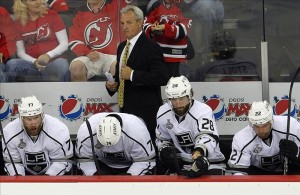It happens all the time in professional sports. A team is underachieving. They aren’t performing up to expectations. Players don’t seem to be developing as a General Manager would have hoped. There seems to be a divide in the locker room. Guys aren’t responding to the coaches system. Something needs to change. You can’t fire a team, thus the most logical option is to get a new voice behind the bench, shake things up, show the players that they need to be better, because the coach just lost his job. There have been instances where a mid-season coaching change is the best thing for a team, and other times where it becomes clear the personal on the ice is the real problem. But there is often a surge in play, a little extra jump in a players step when a new coach enters the room. But statistically speaking, does changing your coach mid-season really make a big difference?

Every Team hopes the Coaching Change will Produce Magic
When the Pittsburgh Penguins fired head coach Michel Therrien in February of 2009, it was a desperate change to try and turn things around. The Penguins, who had gone to the Stanley Cup final the previous Spring, were slipping in the standings, looking nothing like the team that was expected to make another deep playoff run. The firing came after a dismal 6-2 loss at the hands of the Maple Leafs. Pittsburgh was outside of the postseason picture, and something had to give. The team hired AHL coach Dan Bylsma. He had no NHL coaching experience, but was seen to be more of a players coach, whereas Therrien was a disciplined task-masker. Therrien’s voice was clearly wearing thin on the talented Penguins. The team proceeded to go on a remarkable 18-3-4 record under Bylsma, making the playoffs, and going on to win the Stanley Cup.
In the 20011-12 season the Los Angeles Kings went a similar route as the 2009 Penguins, firing coach Terry Murray in December and bringing former Flames bench boss Darryl Sutter. The Kings were a contender, but weren’t playing like one, thus management believed it was time to hire someone new to run the team. And just like in Pittsburgh, it worked, as the Kings made the playoffs and ripped through the competition on route to the franchises first Stanley Cup championship. All the pieces were there, they just needed the right guy to push the right buttons. In the case of these two teams, management believed in the product on the ice, but they knew the players were not going to fulfill their potential unless a new coach came in.
Does Changing the Coach Fix Everything?
This season, there have been four coaching changes. The Senators, the Oilers, the Devils and the Maple Leafs. None of those teams are currently in a playoff spot, although Toronto was in a Wild Card position when the change was made. Now the question is, based on talent-level, should any of those teams be in the playoffs? Is the coach really the problem?
It’s often painfully clear when a team has tuned out its coach, when they have grown tired of his methods, and just aren’t buying in anymore. Players won’t ever admit that they’re playing to get the coach fired, but they know it’s much easier to replace the guy behind the bench than it is to get all new players. It’s a frustrating reality. And most coaches know it. The old saying, you’re hired to be fired, rings true far too often in this league. But sometimes, no matter how good a coach may be, he simply isn’t the right guy for that particular team. He doesn’t know what makes them tick. He doesn’t know how to get the most out of his players. The struggles may not be his fault, but he isn’t doing anything to make it better either.
In the case of Dan Byslma and the Penguins, it can be argued that he inherited one of the best teams in the league, and their success was less to do with him, and more to do with the skill of the players. But what about a club like the Oilers, who have been bad for years, and are still bad it seems, no matter who is behind the bench. We can’t expect such a quick turnaround with a team like Edmonton. Their problems are so much deeper than coaching.

Will the New Coaches Produce Results this Year?
There’s a good chance we will see some more coaching changes before this year is done. But as for the teams who already made the switch, can we expect a big difference? There are two main reasons that a team gets a new coach mid-season. The first is as a final piece to the puzzle for a contending team who just needs a kick in the pants. The second is to stop the bleeding for a team that looks hopeless and the GM has to do something, anything to change the direction.
But keep one very important thing in mind when you’re talking coaching change. When a team isn’t good enough, they aren’t good enough, even if Scotty Bowman was running the show. Sure, you may see a minor surge, you may see a jump in the standings, you may even see a legit playoff run. But at the end of the day, too many times we put the onus on the coach for a team’s plight, without considering hard enough that the team doesn’t have the right mix of players, or enough skill to be a contender. Sometimes, the coach plays a big part, and a change is exactly what the doctor ordered. But most of the time, the owner needs to see something, the fans are begging for something, and getting a new guy behind the bench is the only plausible (and doable) solution.
Yep bad article. No info on the other coaches that came in and how their respective teams are doing.
Based on the title of the article I was really expecting a breakdown of all the coaches in the last X amount of years along with the records for the incumbent coach and the new coach. You know, an actual attempt to answer the question you raised. Instead I get one note about Disco Dan coming in and winning the Cup.